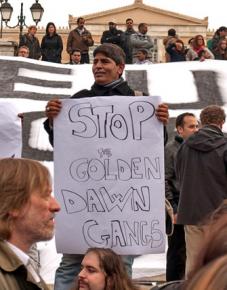The anti-fascist fight isn’t finished in Greece
Anti-fascists in Greece mobilized to oppose a demonstration by the neo-Nazi Golden Dawn at the end of January to mark the anniversary of a 1996 military crisis and sovereignty dispute between Greece and Turkey over two uninhabited islets claimed by Greece, which sit close to Turkey's coast on the Mediterranean Sea.
, a member of the Greek socialist group Internationalist Workers Left (DEA), reported on the success of the anti-fascist mobilization and the ongoing struggle to confront Golden Dawn, in an article for the February 4 issue of DEA's newspaper.
ONE WEEK after the historic victory of the left in the parliamentary elections, the neo-Nazi Golden Dawn show that it remains a force with a nationwide mobilization in Athens on January 31, the anniversary of Imia crisis with Turkey.
The 2,000 fascists who arrived by bus from many regions around Greece is a significant turnout. However, this is much smaller compared to previous parades of hate organized last year and the year before.
At the same time, the presence of 5,000 people mobilized for an anti-fascist march from Omonoia Square to Syntagma Square was the largest mobilization yet in response to the fascist rallies on the anniversary of the Imia crisis.
Despite the electoral support for the neo-Nazis--Golden Dawn, won 6.2 percent of vote, mainly because of the decay of other right-wing parties, including the main center-right party New Democracy, which was expected to lose--the organizational strength of the neo-Nazis has declined.
This is good news, but it doesn't mean that we are finished with the fascists. The fact that Golden Dawn maintained its electoral support confirms the assessment of the anti-fascist movement that the prosecution of its leadership isn't enough to marginalize the Nazis. Support for Golden Dawn within the security forces was also maintained, and incidents of police and neo-Nazis working together in attacks on antifascists in the city of Kavala and the Athens neighborhood of Halandri confirm that close ties still exist between them.

It is obvious that the attempt to regroup and mobilize Golden Dawn members will intensify in the coming weeks and months. They are looking ahead to the upcoming release of Nikolaos Michaloliakos, the Fuhrer of Golden Dawn, and other fascist leaders after an 18-month period of detention that ends in late February. Meanwhile, the long-delayed trial of Golden Dawn on charges of being a criminal organization is expected to begin in April.
The Nazis are counting on the system to protect them so they can continue to be a threat for social movements and the left, while the battle to stop austerity will be directed toward the European Union, the bankers and international financial institutions. Golden Dawn is hoping for a misstep by SYRIZA and a failure of the left in this struggle against austerity, so they can reappear as defenders of Greece who will challenge a corrupt and ineffective political system, especially its left-wing leaders. Golden Dawn wants to build on the growth of the extreme right in Europe and to exploit the Islamophobic outrage eagerly cultivated by both right-wing and center-left governments in the EU.
For all these reasons, the anti-fascist movement and the left need to step up their actions, politically and ideologically, in response to the fascist threat.
THE UPCOMING trial of the Golden Dawn cannot be left, as some on the left claim, as an matter for the judiciary alone. The attempt by Golden Dawn members to be viewed as persecuted victims of the political establishment needs to be answered inside and outside the courtroom as the notorious trial gets closer.
At the same time, we need to demand that the new government cut the umbilical cord connecting the fascists with the police and armed forces, by restarting the investigation into how Golden Dawn has penetrated into the army and the police. Anyone involved in the many cases of cooperation with the fascists and tolerance of their crimes should be kicked out of uniform. The government should prohibit the fascists' parades of hate that result in stabbings and savage beatings of political activists, refugees and immigrants.
But most of all, the government needs to confront the deepening institutional racism of the past years that has fueled the rise of the neo-Nazis. It must enact a series of measures, including closing the concentration camps for detained immigrants, stopping the sweeps to detain more people, demilitarizing the borders, granting citizenship to all children of immigrants, granting legalized status to immigrant workers living in the country, and immediately recognizing the tens of thousands of refugees from wars who reside in Greece.
Meanwhile, the nationalist forces from the Independent Greeks that have been installed in the government, mainly in the ministries of Defense and Foreign Affairs, not only contribute to the weakening of the government's let-wing character, but they can lead, if they can't be contained, into confrontations with Turkey.
For all these reasons, the fight to marginalize fascism must inevitably involve an ongoing ideological and political discussion among the left in the coming months, and especially in connection to the SYRIZA government. A strong response to Islamophobia and homophobia; the active participation of the left in the antifascist struggle; the clear defense of immigrants and refugees as part of the working class; and an internationalist, anti-imperialist approach to Greece's international relations, in opposition to nationalist expansionism--these are all critical ideas that we must insist on.


